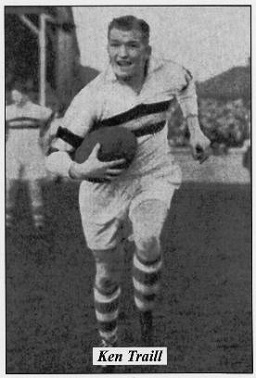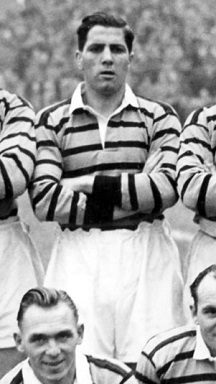Ernest Ward was an English rugby league footballer who played in the 1940s and 1950s, and coached in the 1950s. He played at representative level for Great Britain, British Empire, Combined Nationalities and England, and at club level for Bradford Northern (captain), and Castleford, as a goal-kicking fullback, centre or second-row, i.e. number 1, 3 or 4, or, 11 or 12, during the era of contested scrums, and coached at club level for Castleford. Ernest Ward was a Private in the British Army during World War II.

Kenneth Traill was an English professional rugby league footballer who played in the 1940s and 1950s, and coached in the 1950s, 1960s and 1970s. He played at representative level for Great Britain, England and Yorkshire, and at club level for Hunslet, Bradford Northern, Halifax and Wakefield Trinity, as a loose forward, and coached at club level for Wakefield Trinity.

Ronald "Ron" Rylance was an English World Cup winning professional rugby league footballer who played as a fullback, wing, centre and stand-off in the 1940s and 1950s. He played at representative level for England and Yorkshire, and at club level for Wakefield Trinity, Castleford, Dewsbury and Huddersfield.
Alfred James Croston was an English rugby union, and professional rugby league footballer who played in the 1930s and 1940s, and coached rugby league in the 1940s and 1950s. He played representative level rugby union (RU) for Hampshire, at military level for Army Rugby Union, and the 38th Field Company Royal Engineers, and at club level for United Services Portsmouth, and representative level rugby league (RL) for Great Britain, England and Lancashire, and at club level for Castleford and Wakefield Trinity (captain), as a centre, and coached at club level for Wakefield Trinity.

George Russell Pepperell was an English professional rugby league footballer who played in the 1930s, 1940s and 1950s, and coached in the 1950s and 1960s, and rugby union footballer who played in the 1940s. He played representative level rugby league (RL) for England and Cumberland, and at club level for Seaton ARLFC and Huddersfield (captain) as a fullback, wing, centre, or stand-off he coached club level rugby league (RL) for Huddersfield and Keighley, before moving to Sydney to coach the Manly-Warringah Sea Eagles, he played representative level rugby union (RU) for Rugby League XV, as a full-back, i.e. number 15.

Frederick "Eric" E. Batten was an English rugby union and professional rugby league footballer who played in the 1930s, 1940s and 1950s, and coached rugby league in the 1950s. He played club level rugby league (RU) for Sandal RUFC, and representative level rugby league (RL) for Great Britain and England, and at club level for Wakefield Trinity, Hunslet, Featherstone Rovers (captain), Leeds, Castleford and Bradford Northern, as a wing, and coached at club level for Featherstone Rovers, and Batley. Eric Batten appeared in eight Challenge Cup Finals; two for Leeds, five for Bradford Northern, and one for Featherstone Rovers, winning three, and losing five, he scored a total of 443 tries during his career, he his third on the all-time try scorers list behind Brian Bevan, and Billy Boston,
Isaac Andrew Owens AFM was a Welsh rugby union, and professional rugby league footballer who played in the 1940s and 1950s. He played club level rugby union (RU) for Blaengarw RFC, and Maesteg RFC, and armed forces rugby union for the Royal Air Force, as a number eight, and representative level rugby league (RL) for Great Britain and Wales, and at club level for Leeds, Castleford, and Huddersfield, as a loose forward.
Alan Spencer Edwards was a Welsh rugby union, and professional rugby league footballer who played in the 1930s and 1940s. He played club level rugby union (RU) for Aberavon RFC, the Royal Air Force, and representative level rugby league (RL) for Great Britain and Wales, and at club level for Salford, Leeds, Dewsbury, and Bradford Northern, as a wing.
William Martin Banks was a Welsh rugby union and World Cup winning professional rugby league footballer who played in the 1940s and 1950s. He played club level rugby union (RU) for Maesteg RFC, as a scrum-half and representative level rugby league (RL) for Great Britain, Wales, Other Nationalities, British Empire and Combined Nationalities, and at club level for Leeds, Wakefield Trinity, Huddersfield, Whitehaven and Salford, as a stand-off, or scrum-half.
The 1948–49 Rugby Football League season was the 54th season of rugby league football. This was Whitehaven's inaugural season in the League.
Idris Arthur Towill was a Welsh rugby union and professional rugby league footballer who played in the 1930s and 1940s. He played representative level rugby union (RU) for Welsh Schoolboys and Glamorgan and at club level for Bridgend RFC, and representative level rugby league (RL) for Wales, and at club level for Huddersfield, Keighley, Castleford and Oldham, as a centre or stand-off.
The 1941–42 Northern Rugby Football Union season was the third season of the rugby league’s Wartime Emergency League necessitated by the Second World War. With fewer clubs than the previous season the Rugby Football League (RFL) decided to amalgamate the two county leagues into one joint league. The season started with 18 clubs but finished with 17 after Broughton Rangers withdrew in January 1942. The single division championship was won by Dewsbury, who had finished the season in first position and then defeated Bradford Northern in the play-off final.

Victor "Vic" Darlison was an English professional rugby league footballer who played in the 1930s, 1940s and 1950s. He played at club level for Goole ARLFC, the Featherstone Rovers, Castleford, Wigan, Wakefield Trinity and Bradford Northern, as a hooker or loose forward.
Gilbert Robinson was a professional rugby league footballer who played in the 1920s and 1930s. He played at representative level for Great Britain, and at club level for Wakefield Trinity and Castleford as a fullback or centre.

Frank MugglestoneB.Sc., M.Ed., D.L.C., C.A.G.S. was an English professional rugby league footballer who played in the 1940s and 1950s. He played at club level for Bradford Northern and Castleford, as a (occasional) goal-kicking second-row or loose forward, i.e. number 11 or 12, or 13.
The 1900 Challenge Cup was the 4th staging of rugby league's oldest knockout competition, the Challenge Cup.
The 1948–49 Challenge Cup was the 48th staging of rugby league's oldest knockout competition, the Challenge Cup.
The 1952–53 Challenge Cup was the 52nd staging of rugby league's oldest knockout competition, the Challenge Cup.
The 1936–37 Challenge Cup was the 37th tournament of rugby league's oldest trophy, the Challenge Cup. 32 clubs entered the competition which was won by Widnes who beat Keighley 18–5 in the final at Wembley Stadium on 8 May 1937. This was Widnes' second win in the competition and, to date, Keighley's only appearance in the final.
The 1939–40 Northern Rugby Football League season was an emergency season of English rugby league fixtures necessitated by the outbreak of the Second World War. The regular league season had started at the end of August 1939, but on the outbreak of war all sport was suspended. When government permission for sport to be resumed was given, the league was reorganised into two regional competitions, Yorkshire and Lancashire. The winners of each league playing against each other to decide the overall champions. The Yorkshire competition was won by Bradford Northern who beat Swinton, winners of the Lancashire competition, in the two-legged league final.






